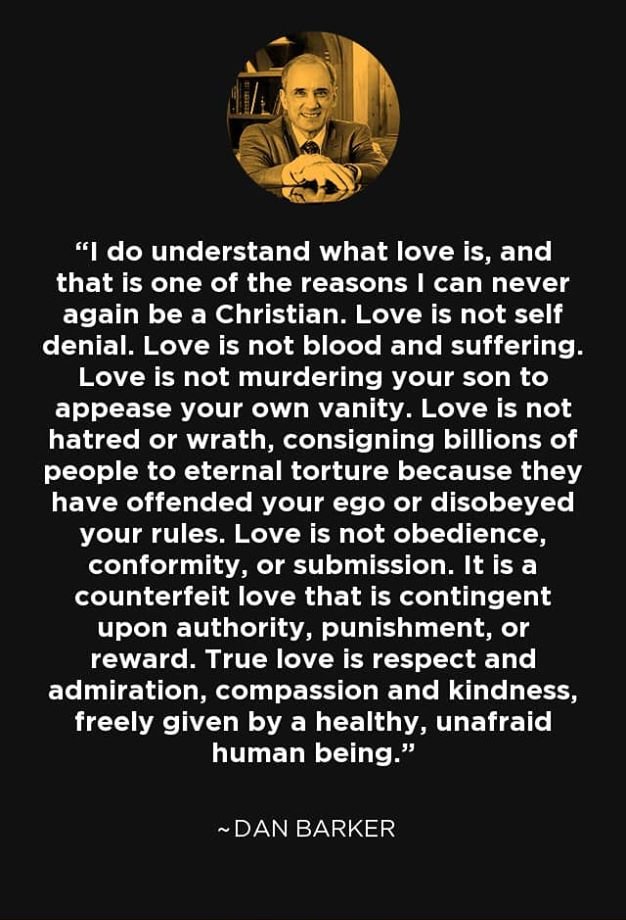For some time now, I’ve been working on some sort of ‘definition’ of ‘sin’ (which is why I put ‘sin’ in inverted commas a lot in my writings, because I am not sure it really exists; I am not sure how I would describe it even if it does; I feel that Religious people have an unhealthy obsession with it; I consider that it has been defeated by Jesus at Golgotha; and even if the Religious people are right and it does exist and is a major problem, still they have never been able to define it accurately and consistently.
Anyway, I still haven’t ‘got’ that definition yet. It’s an ongoing process, but without being too unhealthy 😉
So, here’s a great post on the subject by Ryan Harbidge, a piece which goes a long way towards explaining things, and also offers some interesting and encouraging perspectives:
I was brought to the hospital’s emergency entrance with a gruesome and painful injury. My left shoulder had become completely dislocated. My arm hung uselessly with my shoulder totally out of the socket and the pain was building to an intensity that was almost unbearable.
The emergency doctor looked at me with anger and disgust yelling, “What the hell are you doing here looking like that? That is absolutely disgusting! What makes you think that all of us here need to see that? Did you think of me? Did you consider what seeing that is doing to my well being? Besides, it is against the law to dislocate your shoulder. You will be punished for this!!!”
They gathered around and beat me. The doctors and nurses knocked me off of the gurney and punched and kicked at me for what seemed like an eternity.
Hopefully at this point you are wondering, “What kind of a sick and twisted hospital is that?” After all, this is not how patients are treated at hospitals. The story is partially correct. I did in fact suffer such an injury. The treatment that I received at the hospital, however, was nothing short excellent, with caring staff who had one thing in mind for me: The restoration of my body. Repairing my injuries in order to make things right again. I told the story of this unmerciful hospital to make a point. If you have been a part of either the Roman Catholic or Protestant Christian religion, you have likely been taught that God sees sin as the merciless hospital sees injury.
Where do we get this idea that sin is a moral failure—a coming short of following God’s laws? Looking back at the history of religious development from primitive to modern times, there seems to be a commonality of fear, superstition and anthropomorphism at the heart of every religion. In primitive times, people recognized the obvious design of nature and from that, knew that there is either a force or a person who is in control of, or at least influences what happens around them.
Kind of like at a hockey game where your favourite team wins and you happen to be wearing a certain shirt, you may assume that if you wear that shirt again, your team will win. It becomes your “lucky shirt” and you wear it every time your team plays in order to bring your team good luck and influence their victory. The same thing happens in the development of religion. For example, you have a good hunting season after you have had a feast on the night of a full moon. The assumption is made that the feast on that point on the lunar cycle was an influencer in your good hunting season. Superstition is born.
You recognize that people who are more powerful than you need to be appeased in order for you to live in peace and safety and the assumption is made that whatever force or being (let’s call this “God” for the sake of reference) who made the world you live in must also be like this, anthropomorphism is born.
Sin, therefore becomes something of an infraction of the expectations that this deity expects in order for us to enjoy safety, food and health. A religious system of rule keeping and ceremony is born out of fear of this God in order for Him to provide for your needs. It’s a transactional relationship and anyone in the tribe who breaks the laws is assumed to be putting the whole tribe in danger and is subsequently punished.
We see this in the Hebrew language of the Old Testament scriptures. There are three main words for “sin.”
-chaţţâ’âh chaţţâ’th: (An offence caused by falling short of someone’s expectations of behaviour)
-chêţ: (A crime.) This is also a subjective term, for example, in Deuteronomy 23:21,23 (NASBS)
“When you make a vow to the LORD your God, you shall not delay to pay it, for it would be sin in you, and the LORD your God will surely require it of you. You shall be careful to perform what goes out from your lips, just as you have voluntarily vowed to the LORD your God, what you have promised.”
The person in question only had to pay whatever he promised God because he promised it. If he doesn’t pay, it is a “sin”, however if he hadn’t promised it, it wouldn’t be a sin to not pay it.
-châţâ (to miss)
Interestingly enough, looking at the masoretic texts, there seems to be an evolution of thought as to what “sin” is at some point for the Hebrew people. It is châţâ and its corresponding imagery for “sin” which seems to make it into the language and thinking of the New Testament. In the Septuagint, which came from much older manuscripts than the masoretic texts, we see a consistency of thought in the wording pertaining to the nature of sin.
In the Koine Greek language of the New Testament (and the LXX), we find two main words for the word “sin”.
-Hamartia: (miss the mark) This word has no moral implications. It carries the imagery of an archer shooting an arrow at a target, but coming short of hitting the “bullseye”.
Francois DuToit, who is a Greek scholar was kind enough to send this definition of “hamartia” to me:
“The word hamartia, from ha, negative and meros, portion or form, thus to be without your allotted portion or without form, pointing to a disorientated, distorted identity; the word meros, is the stem of morphe, as in 2 Corinthians 3:18 the word metamorphe, with form, is the opposite of hamartia – without form. Sin is to live out of context with the blueprint of one’s design; to behave out of tune with God’s original harmony. Hamartia suggests anything that could possibly distract from the awareness of our likeness. See Deuteronomy 32:18, “You have forgotten the Rock that begot you and have gotten out of step with the God who danced with you!” Hebrew, khul or kheel, to dance.”
-Paraptoma: This word gets rendered into either “transgress” or “trespass” in English. Personally, I like the imagery of “transgress” better. The imagery seems to be more consistent with the Greek. It makes sense when you consider the words “progress” and “regress”. “Pro” means “forward motion” and of course “Re” is “backwards motion”. The word “transgress” is a combination of the Latin words “trans” which means to “go across laterally” and “gradi” which is “to walk”. Here’s the imagery that forms in my mind. I think of a Canadian winter in which there is snow and ice covering the ground. I am walking towards a goal. I am “progressing” and am “on target”. Suddenly, the terrain changes and I find myself walking along a side slope which is slippery. I start sliding sideways, which takes me off course of my intended goal. I have “transgressed”.
Now that we appear to have a completely different definition for what it means to “sin”, the big question becomes: What is the mark we miss? What is the goal that we slide away from?
I can no longer believe that sin has anything to do with falling short of Gods moral perfection. I have become convinced that it has everything to do with not recognizing our ontological worth and identity.
In the creation narrative of Genesis, we come away with one essential truth: We as humans were created in the “image of God”. We have divine origin. We were declared by our maker to be “good”. The Hebrew word used here is “ţôb” which means “complete, and as it should be”.
There is another interesting word in the Hebrew language and a corresponding word in Koine Greek which speak to human value. The Hebrew word is “kâbôd”. Here is the imagery this word gives us: Back before the invention of paper currency, if you wished to buy, say a cow for example, the worth of that animal would be equivalent to a certain weight of silver or gold. Pretend for a moment that our economy still works this way. If you wish to purchase a live cow, in todays valuation, a cow would be worth approximately 1.8 Troy ounces of gold. In other words, that cow has the kâbôd of 1.8 ounces of gold.
In Greek, we have similar imagery in the word “doxa”. To understand this word, picture this: You are at an auction. A beige 1979 Plymouth Horizon comes up for bidding. I know. It’s unlikely that anyone would actually want to purchase this particular car and that there might even any of these in existence anymore, but work with me here. The first bidder sees the chance of buying a cheap first car for his kid and offers $100.00. You see the car and it brings back a wave of nostalgia as you had a car just like this in high school. (True story for me unfortunately) So, you offer $150.00. The bidding war is on! Others, delusional with auction fever join in, suddenly determined to have this fine automobile. At the end, the car is sold for an unbelievable $5000.00. Is the car worth that? Yes. Why?!? Because someone was willing to pay that money for it. Value is a very subjective thing. Something has value because someone has demand and desire for it. “Doxa” is the assessed value of something.
How are those two words, “kâbôd“ and “doxa” connected? They are both translated into English as “glory”.
Read the words of Jesus high priestly prayer in John 17 with this imagery of “glory” in mind:
After Jesus had spoken these words, he looked up to heaven and said, “Father, the hour has come; glorify your Son so that the Son may glorify you, since you have given him authority over all people, to give eternal life to all whom you have given him. And this is eternal life, that they may know you, the only true God, and Jesus Christ whom you have sent. I glorified you on earth by finishing the work that you gave me to do. So now, Father, glorify me in your own presence with the glory that I had in your presence before the world existed.
“I have made your name known to those whom you gave me from the world. They were yours, and you gave them to me, and they have kept your word. Now they know that everything you have given me is from you; for the words that you gave to me I have given to them, and they have received them and know in truth that I came from you; and they have believed that you sent me. I am asking on their behalf; I am not asking on behalf of the world, but on behalf of those whom you gave me, because they are yours. All mine are yours, and yours are mine; and I have been glorified in them. And now I am no longer in the world, but they are in the world, and I am coming to you. Holy Father, protect them in your name that you have given me, so that they may be one, as we are one. While I was with them, I protected them in your name that you have given me. I guarded them, and not one of them was lost except the one destined to be lost, so that the scripture might be fulfilled. But now I am coming to you, and I speak these things in the world so that they may have my joy made complete in themselves. I have given them your word, and the world has hated them because they do not belong to the world, just as I do not belong to the world. I am not asking you to take them out of the world, but I ask you to protect them from the evil one. They do not belong to the world, just as I do not belong to the world. Sanctify them in the truth; your word is truth. As you have sent me into the world, so I have sent them into the world. And for their sakes I sanctify myself, so that they also may be sanctified in truth.
“I ask not only on behalf of these, but also on behalf of those who will believe in me through their word, that they may all be one. As you, Father, are in me and I am in you, may they also be in us, so that the world may believe that you have sent me. The glory that you have given me I have given them, so that they may be one, as we are one, I in them and you in me, that they may become completely one, so that the world may know that you have sent me and have loved them even as you have loved me. Father, I desire that those also, whom you have given me, may be with me where I am, to see my glory, which you have given me because you loved me before the foundation of the world.
“Righteous Father, the world does not know you, but I know you; and these know that you have sent me. I made your name known to them, and I will make it known, so that the love with which you have loved me may be in them, and I in them.”
Note how Jesus says, pertaining to Himself: “you have given him authority over all people, to give eternal life to all whom you have given him.” Who has God given Him? All people of course. Yes, He acknowledges the loss of one person, presumably Judas. This does not imply a static or irreversible state of being. For being lost simply makes you eligible for being found.
Near the end of this beautiful prayer, He says, “The glory (assessed value) that you have given me I have given them, so that they may be one, as we are one, I in them and you in me, that they may become completely one, so that the world may know that you have sent me and have loved them even as you have loved me. Father, I desire that those also, whom you have given me, may be with me where I am, to see my glory, which you have given me because you loved me before the foundation of the world.“
In other words: “The assessed value that You have given to me I have given to them.” Jesus, I believe is the perfect manifestation of the eternal Christ (the enfleshment of God) and thus possesses the same value as God the Father. He has given us the same value! How awesome is that? And why? So that there may be a praxis of unity.
Have you ever been in a crowd of people who are incredibly rich, famous or successful in some way that you are not? There is a hierarchical social structure that automatically forms. If you are of a low place in society, you don’t feel like you can approach people of higher position as equals. There cannot be unity if there is a perceived difference in the value of people in a crowd. Jesus levels the playing field between us and our maker by giving us the same value…or perhaps by restoring the value we have always had.
At the national mint where currency is printed, a $100 bill is given the value (glory) of $100. That is the objective value it has. No more. No less. If that bill falls out of its owners pocket and is dropped into a mud puddle on the road, becoming soiled, if cars drive over that bill, damaging it and tearing it, is it still worth $100? Of course it is. Neither its poor appearance or its lostness has altered its value. Should you be so fortunate to find that bill, it can still be traded for something of equal value. If you trade this $100 bill for something that is only worth $5, you have “missed the mark” and have not treated it according to its true value.
Each of us as humans have been made in Gods image. We are declared to be good—complete—as we should be. This is the assessed value given to us by God Himself! Throughout our lives however, we are told that we have lesser value. People do this. Organizational systems do this to us. The church does this. Ever heard of the doctrine of “original sin”? You see, it’s much easier to create a social or systemic structure to your advantage if you can convince other people that they are worth less than you. This is what we call the “sin of the world”.
That’s right. Things we do like: murder, theft, coveting, lying, etc., are not sin. They are symptoms of sin. The real sin is this: When you either give to another person or receive from a person or system an assessment of value which is lower than what God has already given you. This is sin.
When you have a cold, you get a runny nose and a cough. The snot, phlegm and noise of coughing is not the cold. The rhinovirus is. The gross stuff that is offensive to everyone around you is simply the symptoms of the virus.
If you have been told and believe that you are ontologically flawed from the get-go, that you are worth nothing and are utterly sinful, that is how you will behave. Your perceived, assessed value will ultimately be reflected in your behaviour. From your lowered sense of worth, comes “sinful” actions. It is impossible to consistently live a life that reflects a value higher than what you think you are worth. Ever wonder why so many religious people tend to fall and fall hard into a lifestyle of “sin”? They live a disingenuous life with the belief that they are sinful, but hold themselves to a higher sense of morality, because that’s what they believe God expects of them. It’s the same transactional mindset of primitive religion. The problem is, that you cannot keep up the facade. You will ultimately fail in your quest for a “moral” life. It doesn’t matter if you are a high profile preacher or just an average person. The only difference is that the high profile guy gets noticed more.
The gospel has nothing to do with a prayer you must pray, a set of beliefs you must hold to and behaviour you must keep in order for God to be pleased enough with you that He will let you into heaven one day. The gospel is the announcement that you have never lost your value. You are worth the same as God Himself. You are as you should be. You are good. The gospel is that we don’t have to live from a low valuation of self.
The words of Jesus in Luke 10:26-28 (NASBS):
“And He said to him, ‘What is written in the Law? How does it read to you?’ And he answered, ‘You SHALL LOVE THE LORD YOUR GOD WITH ALL YOUR HEART, AND WITH ALL YOUR SOUL, AND WITH ALL YOUR STRENGTH, AND WITH ALL YOUR MIND; AND YOUR NEIGHBOR AS YOURSELF.’ And He said to him, ‘You have answered correctly; do THIS AND YOU WILL LIVE.’”
Jesus is not telling this inquisitive lawyer how to act in order to please God. He is telling him how you act naturally when you behave from a knowledge of what you are already worth! He is describing how to live as one who is fully and beautifully human! Whenever you treat someone with kindness, whenever you refuse to respond to violence with violence, whenever you put the needs of someone else ahead of yourself, you are behaving in the most natural, truly human way. You are behaving from who you are. This is what pleases God. When we engage in relationship with Him, we participate in the healing of the world.
In the first chapter of the gospel of John, John the Baptist sees Jesus coming toward him and announces, “Behold the lamb of God who takes away the sin of the world.” That is indeed what Jesus started, but did not complete. You see, it was important for God to become enfleshed as one of us, to bring back dignity to humanity and to restore our “glory” as humanity had completely lost sight of our value. Jesus gives us permission to believe that we are good. And because we are good, we can behave in a way that reflects who we are. I believe that “taking away the sin of the world” is a task that needs to continue. It is a job that each of us is called to. Each of us needs to communicate to other people that we come into contact with everyday that they too are priceless. They too are created in the image of God and are complete and good as they are. We need to participate with God in taking away the devaluation of humanity and restore proper worth revealing every person as equal. It seems like a big job, but it really comes naturally when you live from your true self.
Once more…and if it seems like I am repeating myself, I am. You are NOT morally depraved. You do NOT have a sin nature.
You ARE good. You ARE created in the image of God and share His value. Your nature is love and you can only thrive when you participate in what is natural for you.
Repeat this to yourself every day. Change your mind about who you are and watch how your behaviour naturally shifts as you understand who you have always been!
– Ryan Harbidge, used here with his kind permission
Here is the link to the original article













